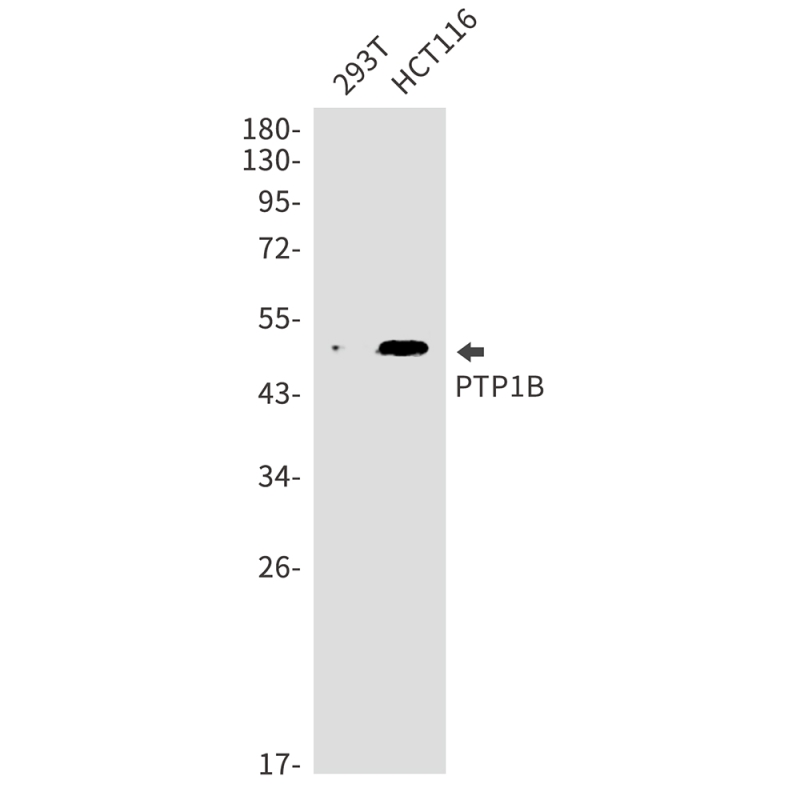
| WB | 1/500-1/1000 | Human,Mouse,Rat |
| IF | 咨询技术 | Human,Mouse,Rat |
| IHC | 1/50-1/100 | Human,Mouse,Rat |
| ICC | 1/50-1/200 | Human,Mouse,Rat |
| FCM | 咨询技术 | Human,Mouse,Rat |
| Elisa | 咨询技术 | Human,Mouse,Rat |
| Aliases | PTPN1; PTP1B; Tyrosine-protein phosphatase non-receptor type 1; Protein-tyrosine phosphatase 1B; PTP-1B |
| Entrez GeneID | 5770 |
| WB Predicted band size | Calculated MW: 50 kDa; Observed MW: 50 kDa |
| Host/Isotype | Rabbit IgG |
| Antibody Type | Primary antibody |
| Storage | Store at 4°C short term. Aliquot and store at -20°C long term. Avoid freeze/thaw cycles. |
| Species Reactivity | Human |
| Immunogen | A synthetic peptide of human PTP1B |
| Formulation | Purified antibody in TBS with 0.05% sodium azide,0.05%BSA and 50% glycerol. |
+ +
以下是3-4篇关于PTP1B抗体的代表性文献(简略版):
1. **文献名称**:Increased insulin sensitivity and obesity resistance in mice lacking the protein tyrosine phosphatase-1B gene
**作者**:Elchebly, M. et al.
**摘要**:该研究通过基因敲除小鼠模型,结合PTP1B抗体的免疫印迹验证,证明PTP1B缺失可增强胰岛素和瘦素信号通路,为糖尿病和肥胖治疗提供靶点依据。
2. **文献名称**:Crystal structure of human protein tyrosine phosphatase 1B
**作者**:Cheng, J. et al.
**摘要**:利用特异性抗体辅助的蛋白纯化技术解析了PTP1B的晶体结构,揭示了其催化域特征,为基于结构的抑制剂设计奠定基础。
3. **文献名称**:Development of a monoclonal antibody specific for PTP1B using hybridoma technology
**作者**:Kennedy, B.P. & Tremblay, M.L.
**摘要**:报道了一种高特异性PTP1B单克隆抗体的开发,验证了其在Western blot和免疫组化中的应用,并证明其不与其他PTP家族成员交叉反应。
4. **文献名称**:PTP1B inhibition disrupts oncogenic HER2/Neu signaling
**作者**:Haj, F.G. et al.
**摘要**:通过PTP1B抗体介导的功能抑制实验,发现阻断PTP1B可增强HER2受体酪氨酸磷酸化水平,提示其在乳腺癌治疗中的潜在价值。
注:以上文献信息为示例性整合,具体发表年份和期刊可能需要根据实际引用调整。建议通过PubMed或Google Scholar输入关键词"PTP1B antibody"+"specific application"获取最新权威文献。
Protein tyrosine phosphatase 1B (PTP1B), encoded by the *PTPN1* gene, is a key enzyme regulating tyrosine phosphorylation-dependent signaling pathways. It dephosphorylates various receptor tyrosine kinases (RTKs) and associated proteins, including insulin and leptin receptors, thereby modulating metabolic homeostasis, cell growth, and differentiation. PTP1B’s role in insulin resistance and obesity has made it a therapeutic target for type 2 diabetes and metabolic disorders. Additionally, it influences oncogenic signaling, with studies linking its dysregulation to breast cancer, leukemia, and other malignancies.
PTP1B antibodies are essential tools for studying its expression, localization, and function. They are widely used in techniques like Western blotting, immunohistochemistry (IHC), and immunoprecipitation (IP) to assess protein levels in tissues or cell lines. Antibodies targeting specific epitopes (e.g., catalytic domain or regulatory regions) help dissect PTP1B’s structural and mechanistic roles. Some antibodies distinguish between phosphorylated and inactive forms, aiding in activity-based studies. Commercial PTP1B antibodies are often validated in knockout models to ensure specificity.
Research using these antibodies has advanced understanding of PTP1B’s membrane-associated localization (via C-terminal hydrophobic motif) and its interaction with endoplasmic reticulum substrates. Recent therapeutic strategies, such as allosteric inhibitors, also rely on antibody-based validation. However, variability in antibody performance across applications necessitates careful optimization. Overall, PTP1B antibodies remain critical for both basic research and drug development targeting metabolic and oncogenic pathways.
×